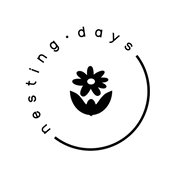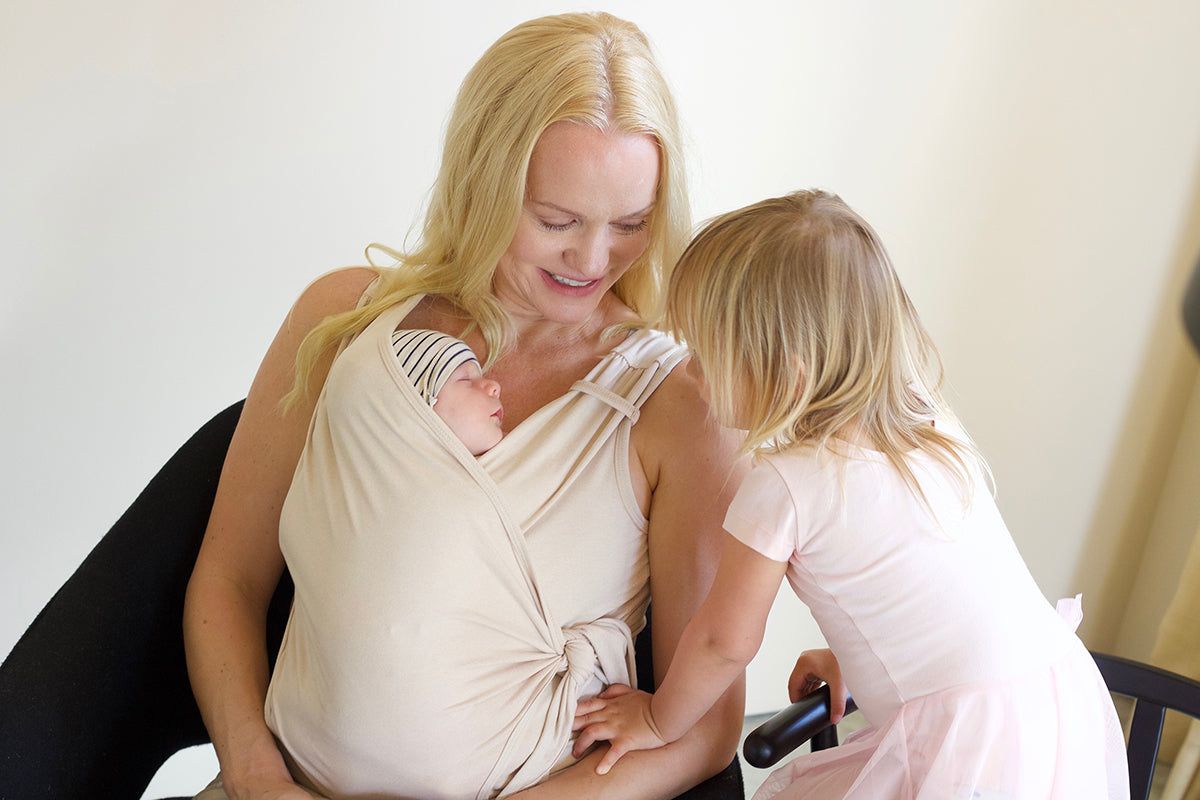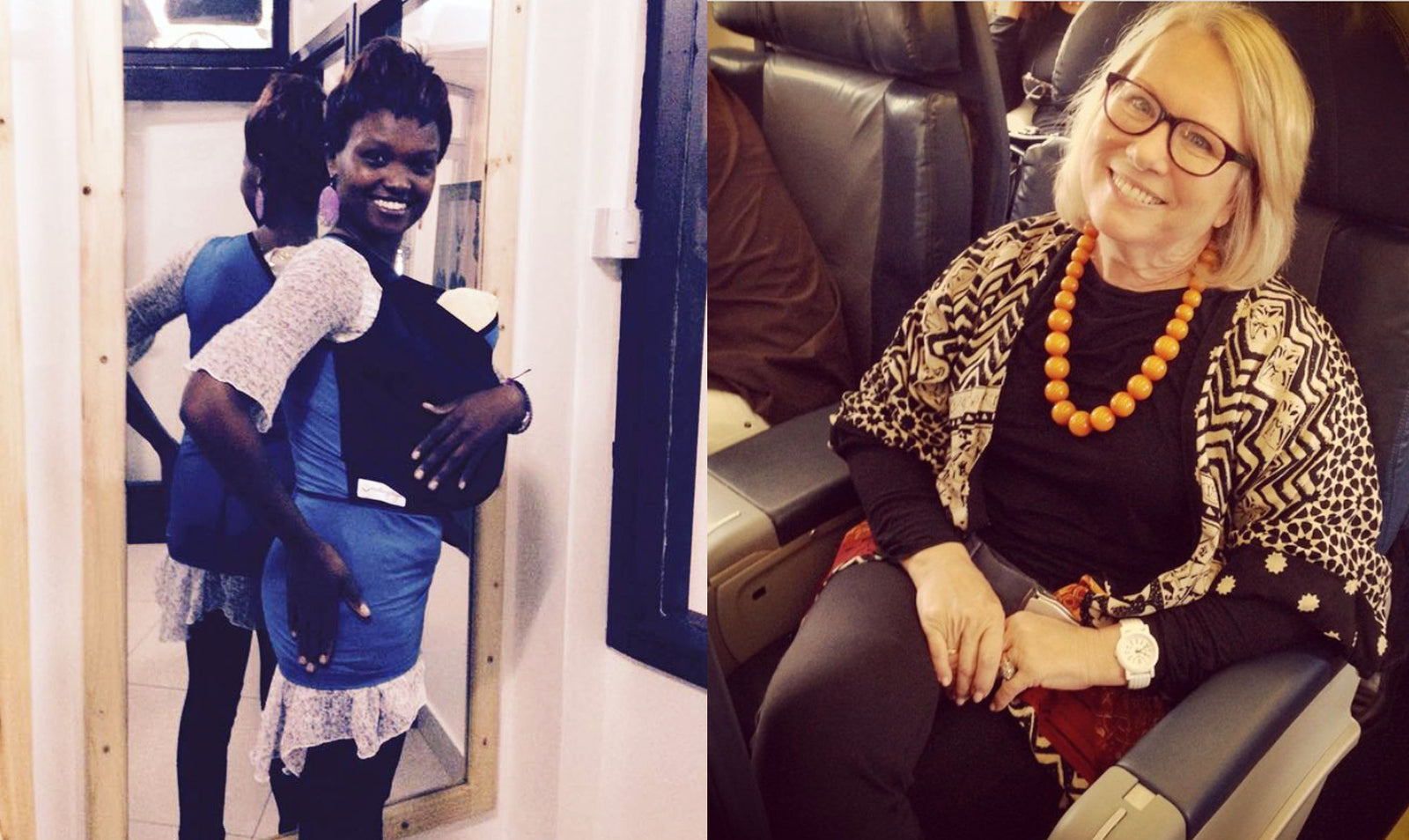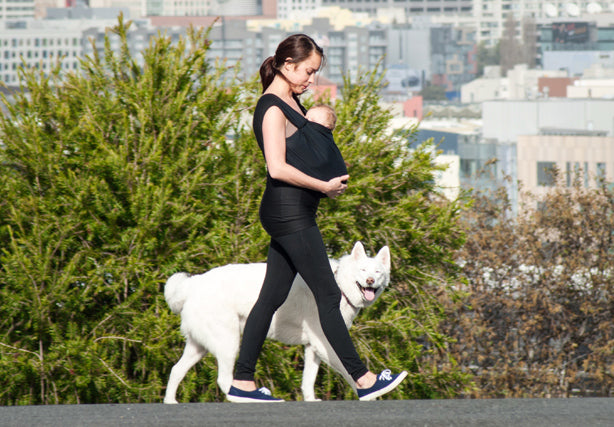One of the best parts of being the Chief Mother Officer of Nesting Days is the people I meet.
I remember the day I met Holly. She was standing in front of a local restaurant wearing lime green ring sling. I was in the car, pulled over, and handed her my business card. She smiled, thanked me, and I drove off. (Chief Mother Officers do things like that...at least I do.) Holly bought one of my inventions and we've stayed in touch ever since. She's now the mother of two little girls, and she has generously agreed to do an interview about how being a breast cancer survivor has shaped her life.
Enjoy the read.
LOOKING BACK: A BREAST CANCER DIAGNOSIS
JULIE: How has your journey with breast cancer changed your perspective on life?
HOLLY: I was diagnosed at 28. I’d had two surgeries to try and remove the cancer, and we realized that there was some spreading and there was a two week period where we weren't sure if it had spread to the lung. [If it has spread to the heart] it would not be able to be excised and would be terminal because my type was not curable. It could only be excised. So for that two week period, not really having any guarantee that I would be okay [was] pivotal for me. After life-saving surgeries, including a double mastectomy, I was cancer-free and underwent reconstructive surgery.
Looking back on how the diagnosis and procedures have affected me, I started a family and became a mom. That had really shaped my parenting. I feel that as a result, I live in the moment every single day and appreciate all the things that I've been blessed with – primarily being blessed with my two sweet girls. I think a lot of parents feel really stressed with motherhood. I just don't feel that. While there are times that it can be stressful, I am expecting the chaos a little bit and just kind of enjoying the chaos.
LOOKING FOR BREAST MILK
JULIE: Can you speak about the effort that you made to get breastmilk and the community that you found available to you? I love that you were not afraid to ask for that needed.
HOLLY: I ended up feeding both girls for over a year on borrowed milk. In San Francisco, I had two or three donors that were really consistent and called me every week, but I didn't have that in L.A. I just had random [donors] from the Human Milk for Human Babies website, which I'm so grateful for. It's such a beautiful community. Nothing was more depressing than when my freezer was starting to get empty and I didn't know where my next supply was coming from. I wanted to feed breastmilk for a year just because I know it really reflects in the health and microbiome.
I remember one woman was like, “I was going to throw it all out,” but she was ending her breastmilk journey and she had pumped the whole time and had something like 600 ounces. That is so amazing to a mom that just wants to give her baby the best. You know, [had it not been for the breast cancer] I think I would've otherwise been that mom, that breastfeeds for two years. Having that community was just so amazing. Sometimes women who are going through tough situations with breastmilk don't realize that this community exists and people are willing to help get you through until your supply comes back or whatever. There is help out there. I bottle-fed both my girls the donated breastmilk, holding them skin-to-skin and heart-to-heart in my Nesting Days carriers.
BONDING IN THE FIRST MONTHS
JULIE: That’s a great way to bond in a very intimate way.
HOLLY: That's a good point. When you have your baby, you really crave that deep connection that breastfeeding can offer. Having her skin-to-skin in the carrier with a bottle felt like the breastfeeding connection that I was missing, so I did often feed in the carrier. It was a good bridge for me to have that deep connection with my baby.
JULIE: You’re a very strong advocate of and big cheerleader for our carrier. What would you have to say to others who, for whatever circumstances, also can't breastfeed – including other survivors, adoptive parents, and partners?
HOLLY: I'm such a big advocate for baby wearing and am very depressed that my two and a half year old won't let me wear her anymore! [laughing] It is such a brilliant way to bond with your baby, especially when you don't have that ability to breastfeed your baby. With baby wearing for both of my girls, I got the sense that they were always content and always happy.
Friends would say, “Gosh, you got a unicorn baby. You're just lucky.” And I'd suggest “Well, I think they're much happier when they're close to you…” Well guess what? Baby number two comes, and guess what – she’s a unicorn, too. Is it the baby or is it the content feeling that they get when they're close to our heart and not unsure about their environment? In a stroller, they don't have that same warm connection or feeling that they're fine and safe. For me, that was instrumental in [developing] the general content personalities of both my babies and I truly wore them both until they were practically saying, “Okay, stop, Mom!”
Now, as a part of the whole baby wearing experience, both of my girls are really cuddly, and very, very warm and they want to be close to me. Even still – Willa, who's five, if she's had having a hard time, acting out, having a little bit of a tantrum, she knows – she'll come to me and say, “I just need a little love” and she'll just tuck herself in my lap. I think that comes from [when] they felt safe, they felt secure – and that's what baby wearing offers. I’m such a big proponent for it and I always gift my new mom friends a carrier.
MOTHERHOOD THESE DAYS: ADAPTING TO CREATE COMMUNITY
JULIE: I think you know, one of my happiest, ever ‘jobs’ was as preschool teacher on Stanford’s campus, and it really shaped my parenting style with my two boys. I understand you started a preschool pod for your girls during COVID.
HOLLY: Yes, I hired a Waldorf teacher, so it's been pretty awesome since they're in the forest most of the time with a little bit in the classroom that I made here at my home. It’s going so well I plan to add a first grade pod next year for my oldest daughter so there will be two pods, two teachers, and two areas dedicated to schooling.
JULIE: You are restructuring an educational system that you understand is intuitively and spiritually right for you and your children. Say a little bit more about that.
HOLLY: I think the biggest thing is building a real community. Living in a city, you can lose that feeling. Even though we had lived here prior and coming back with a one-year-old, we realized we didn't have any community, so we really looked forward to starting preschool, and once we started then COVID happened just as we were building a community. So for me, I wanted to build that and create my own circle of like-minded friends.
HOLLY’S TAKEAWAYS FOR MOTHERHOOD
JULIE: What would you like other mothers to know?
HOLLY: I think my biggest message is – it sounds so cliché – to really live more in the moment. I see people just not really living their best life because they don't understand how fleeting time can be.
Keep curating that ideal life because every day is a new opportunity to keep curating and making your life exactly what you would manifest it to be. I think that is really powerful – to really have the most enjoyment from exactly where you are in that moment.
All those little eyes are always watching you. That’s even more of a reason to be the captain of the ship that has a very peaceful disposition and strong leadership, because they're always watching, they're always listening, and they're always learning. I take that responsibility greatly because I want to give them the best opportunity to find ultimate happiness too, without having to go through a painful situation.
N.E.S.T. - Nurture Educate Support Transform
JULIE: When I created Nesting Days my goal was to provide a 'nest' for newborns, and to provide a better welcome to the world for babies and their parents. I've been asking parents what these four words mean to them. Would you take a minute to share your thoughts?
HOLLY:
N. - NURTURE: I would say selflessness and realizing that your primary focus is to allow the child the space to grow and develop as best as they can. Nurture, as basic as it sounds is, mostly dependent on a lot of love: using love to deal with most things. Even with a tantrum or when they're having a hard time, I find that's my go-to. I don't reprimand or say ‘you need to be quiet,’ nothing like that. I see all of these as opportunities to offer more love and support, and that's how they can get through that struggle. That's probably what most of us needed a little more of as children. That's my nurturing language is just to offer love – even in those really hard moments where they're really upset with you or mad at their sister or making a scene in a restaurant – give the love that they're needing.
E. - EDUCATE: I definitely sought out a lot of information to try to be a very intentional parent because you are your child’s first teacher. There are so many things that you can read and learn when it comes to parenting and everybody has their own ideas, but finding what resonates with you and following your intuition is so important. You don’t have to it all figured out at once, but stay curious, always seek information, and continue to educate yourself so you can be a better educator for them.
S. - SUPPORT: With community, find people that truly get you. Community is everything. With the pandemic, [community] was kind of ripped away from everyone, and now that we're picking up the pieces, now more than ever, so many of us are really leaning into developing an even better, tighter community. We've missed that and the babies have missed that. Now, when we get together and do play dates, I see this strong reaction from the pandemic. I was at the beach with Wilhelmina's best friend and their family. The two of them were standing there and they had their arms around each other, they’re best buds. At one point, her little friend turned and kissed her on the cheek and said, “I love you friend!” That was just such a moment for me.
T. TRANSFORM: I think it's about constantly translating those experiences and curating that specific life that is feeling so supportive of your values and ethics. If you would have told me in 2019 that I was going to start a school, nearly, I would've thought “What, why would I do that?” But now, here we are, and I’m proud of myself and happy for the hardships that came. I am grateful for all of the transformative experiences, the most powerful being the births of my children. As I grew up without a mother, I had to really dig pretty deep. I did a lot of work around birth to find that support within myself because I didn't have a mother coming to my bedside to tell me I was going to be okay or welcome me into this process. My father had just passed away the same year I got pregnant with my first. And so the only parent I had was now missing. Birth became this ultra-transformative experience into motherhood.
Thank you, Holly.
JULIE: More than asked for, and more than I hoped for. As I said in the beginning, the best part of being the Chief Mother Officer is the people I meet.
Learn why Mom's love nesting days!





Leave a comment (all fields required)